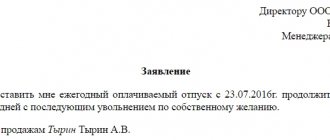Legal standards
Despite the fact that the Labor Code does not stipulate such a concept as time off, the procedure for compensation for overtime work is defined quite clearly therein. Thus, work performed by order of the manager outside working hours is paid for the first two hours at least one and a half times the average hourly earnings, and for each subsequent hour at least double (Article 152 of the Labor Code of the Russian Federation). By mutual agreement between the employee and the employer, overtime work can be compensated not financially, but by providing an additional day of rest.
According to Art. 153 of the Labor Code, work on weekends or holidays is paid no less than double the salary. If a holiday or day off includes part of the working day, the employer is obliged to compensate only the hours actually worked during non-working hours. By agreement of the parties, instead of increased pay, the employee may receive an additional day of rest - in this situation, work on a weekend or holiday is compensated at a single rate, and the time off taken by the employee is not paid.
The specific amounts of monetary compensation for overtime work, as well as work on weekends and holidays, are regulated by an employment contract, a local regulatory act adopted taking into account the opinion of the trade union organization of the enterprise, or a collective agreement. However, the compensation paid cannot be less than that prescribed in legislative acts.
Increased pay is also provided for overtime within the shift schedule and night work. When donating blood (i.e. donation), the employer is obliged to retain for the employee his earnings for the days of donation and the rest days provided in connection with them (Article 186 of the Labor Code). Time off can be taken without prior work, for example, in the case of:
- death of a close relative;
- official marriage;
- the birth of a child.
Any of the above events is sufficient grounds for requesting time off towards a future vacation.
In this case, the employee has the right to take days off for several days (or even weeks), however, it must be taken into account that in such a case no more than 14 days can be counted towards the length of service. If an employee has chosen time off rather than financial reward, he can use additional rest at any convenient time , but be sure to notify the employer no later than three days before the requested date. Absence from work without prior notice often becomes grounds for dismissal.
https://youtu.be/-Z7y5mthtgk
Time off upon dismissal
If an employee terminates an employment relationship on his own initiative, he is obliged to notify the employer about this by submitting to the latter an application in the established form no later than 14 days before the expected date of dismissal (Article 80 of the Labor Code of the Russian Federation). Employees who have unused time off often take vacation for this period, thus compensating for the allotted rest days.
An employee who wishes to use available time off and then resign must submit an application to the employer in the prescribed form indicating both requests. In turn, the employer issues two orders - on leave and on dismissal, and then fills out the employee’s work book and makes all payments required by law.
You need to understand that time off is not regulated by the Labor Code, therefore, if there was an oral agreement, the employer is not obliged to compensate for unused time off in any way - this depends primarily on the personal qualities of the manager and his attitude towards the employee.
If the overtime was officially documented, no misunderstandings can arise between the parties - management must provide days off before terminating the employment relationship or make payment upon dismissal. In the second case, the employer’s failure to fulfill his duties may become grounds for the employee to go to court.
What to do if they don't pay?
If the compensation due to the employee is not paid by the employer on time, then the employee may resort to such types of protection of his own rights as:
- Send a written request to the employer to reimburse vacation pay. As a rule, this method rarely works. If the employer is dishonest and has not paid the required compensation on time, then it is unlikely that such treatment will affect him.
- Contact the labor inspectorate with a statement outlining the violation committed by the employer. Having received the application, the inspector will conduct an inspection, on the basis of which an order will be drawn up to pay compensation to the employee. The Labor Inspectorate will ensure that this order is followed.
- Contact the prosecutor's office with a statement also containing the essence of the employer's violation.
- Apply to the court with a statement of claim, which will set out the employer’s violations and the requirements against him.
This is important to know: Maternity leave for twins
When contacting any of the above-mentioned authorities, you will need to present your passport and an employment contract concluded with an employer who is violating the terms of payment of compensation. It will also be necessary to draw up a corresponding statement describing the violations of the employer and the requirements for him.
If an employer does not pay compensation for vacation, the labor inspectorate may hold him accountable and impose a fine on him.
Thus, upon dismissal, the employee is required to pay compensation for unused vacation on the day of termination of the employment relationship. Currently, there are many calculators on the Internet that allow you to quickly and correctly calculate the amount of compensation, taking into account all the rules. If the employer does not fulfill his obligation to make this payment, then the employee must contact human rights authorities.
Payment for unused vacation days
When an employee is dismissed, all unused time off that has been documented must be paid in accordance with the reason for which they were assigned. For example, if an employee was at the workplace by order of the manager on a weekend or holiday, when calculating compensation one should be guided by Art. 153 of the Labor Code, if he worked overtime - Art. 152 Labor Code of the Russian Federation. For greater clarity, we can cite two situations as an example:
- The average hourly salary of an employee is 180 rubles. In September, he worked 8 hours overtime (September 5 - 3 hours, September 8 - 3 hours and September 15 - 2 hours), and subsequently expressed a desire to replace monetary compensation with additional rest in December. However, on December 2, the employee quit without taking advantage of the allotted time off. Since the first two hours of overtime work should be paid at one and a half times the rate, and each subsequent one at double the rate, for September 4 and September 8 he should be paid 900 rubles (180 * 2 * 1.5 + 180 * 2), for September 15 - 360 rubles ( 180*2). The total amount of compensation due to the employee will be 2160 rubles.
- In November, the employee worked 8 hours on a day off, then wrote a request to pay for the work in a one-time amount, providing an additional day of rest in December. At the beginning of the next month, the employee quit, but the time off remained unused. Since the dismissed person has already received a one-time labor compensation, compensation for the time actually worked should also be accrued in a one-time amount. If the average hourly salary of an employee is 200 rubles, he should be paid 1600 rubles (200*8).
To receive financial compensation, an employee’s application for its accrual and payment, a corresponding order from the manager and an accounting certificate are required.
The required amount is given to the employee on the day of dismissal along with wages, travel allowances and other payments that are due to him by law. Each time off that was officially documented and remained unused at the time of dismissal must be paid to the employee in the appropriate amount .
If an employer doubts the need to accrue financial compensation, he will be helped to make the right decision by the fact that an employee whose rights have been violated can go to court, and this will entail both lengthy proceedings and additional costs.
What affects the ability to pay time off?
Let's say a person quits his job and has unused time off. In this case, can he receive compensation for them? There is no clear answer to this question. The following factors need to be taken into account:
- does the enterprise keep records of time off paid to employees (is this information displayed in the working time sheet, orders);
- the reasons why the person received time off;
- whether the employee wants to use time off or wants to receive compensation from the employer during dismissal.
In connection with the use of time off and their compensation, there are many legal disputes. Unfortunately, sometimes an employee should try to resolve the issue peacefully rather than start a lawsuit. And what is best to do depends on the current situation. Let's look at each of them with an example.
If the company does not keep records of time off
Unfortunately, not every enterprise takes into account all time off officially. Sometimes this practice occurs: a person stays late at work to complete an urgent assignment, and then the employer allows him not to come to work for 1 or several days.
In this case, there is an unofficial leave of absence, which is not documented in any documents. Therefore, the employee will not be able to receive compensation for it, unless the employer pays him out of his own pocket. Possible solutions to this situation:
- use time off before dismissal;
- forget about extra rest time.
Exactly how to proceed depends on the decency of the employer and his consciousness.
If time off is documented
It will be easier for an employee to defend his rights if his time off is officially assigned, that is, there is a corresponding order, a mark on the report card. But even then there are different scenarios for the development of events:
- Let’s say a person is fired without his consent, but he has not yet managed to find a new job. In this case, the employee may choose to use additional rest time. What are the advantages? For example, using time off when leaving due to layoff, a person increases his continuous work experience for the duration of such rest. He can also use this time to find a new employer. However, from the point of view of financial benefits, such a solution is not always suitable for the employee. Although, in the event of dismissal due to layoffs, he will receive many other compensations on which he can live while looking for a new job.
- The employee decided to leave his current job on his own. Most often, in this case, a person wants to receive monetary compensation for time off when leaving at his own request. However, it is necessary to understand that financial equivalent is provided only when it comes to paid additional rest time.
Most often, an employee wants to receive compensation for time off upon dismissal at his own request. In such cases, he has already found a new place of work, as a rule, and wants to begin performing his duties as soon as possible.
However, even if there is evidence of the right to time off, the accountant may not provide compensation for it. Unfortunately, labor legislation does not directly regulate this issue, and judicial practice is quite contradictory. Therefore, it is better to try to resolve the issue peacefully with your employer.
During dismissal, compensation is paid to the employee. The employer is obliged to pay money for the period actually worked, as well as for unused vacation. These two payments are found everywhere, but there are also those that arise only in certain situations. This also includes the situation with payment of accumulated time off.
At many enterprises, work on weekends or beyond the norm is compensated by providing time off. And a large number of workers quit before they have used up the accumulated time. These unused days upon termination of the employment relationship must be compensated to the ex-employee. And although this issue is not clearly regulated by the Labor Code of the Russian Federation, in order to avoid problems with the labor inspectorate, it is recommended to pay the funds in the same way as it should have happened if additional vacation days had not been provided.








